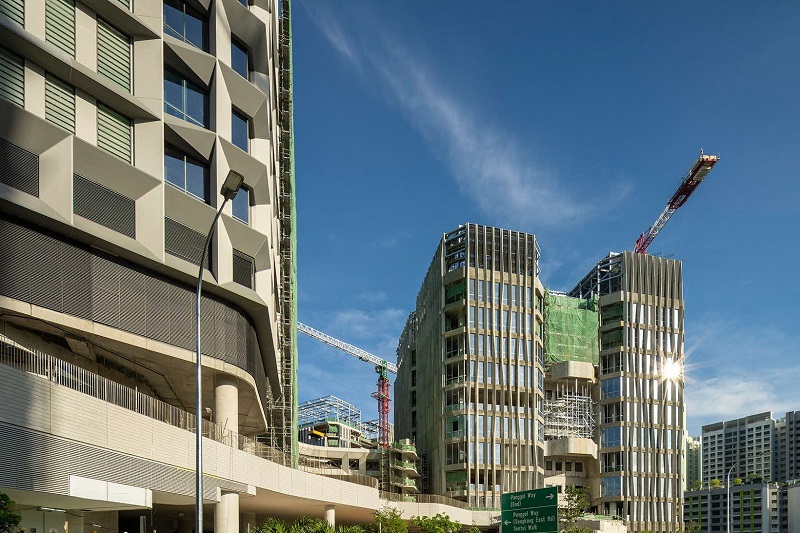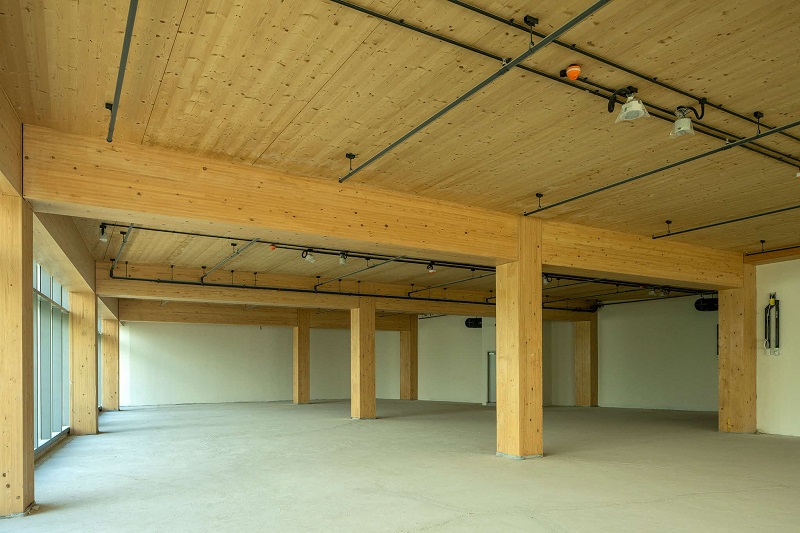By some estimates the global economy risks losing a staggering 18% of its GDP due to climate inaction. Not surprisingly, more and more businesses accept they must embrace a low-carbon future. With this in mind, JTC is developing Punggol Digital District (PDD) as a dynamic precinct where economic growth and environmental stewardship converge.
Situated at the northeastern reaches of the city-state, PDD will be a showcase for Singapore’s Smart Nation ambitions. This vibrant and inclusive district will bring together cutting-edge technology, sustainable practices and social innovation to transform work, learning and leisure. The new, hyperconnected infrastructure will help businesses of all kinds thrive in a sustainable, connected environment.

At 50 hectares, PDD is the largest mixed-use Green Mark Platinum District in Singapore.
Seizing the opportunity: Implementing sustainable solutions
Businesses grappling with the challenges of transitioning to a net-zero or low-carbon economy need tangible solutions to help them get there. From water conservation, to energy efficient buildings, to district cooling, to eco-friendly waste management, PDD offers a raft of green tech solutions designed to accelerate the adoption of sustainable business practices, optimise operational processes, and minimise environmental impact.
Green tech innovation that works for business
Apart from the environmental impact, dependence on traditional energy sources can expose businesses to supply chain risks and price fluctuations. Interruptions in energy supplies disrupt business operations and incur significant costs. By diversifying energy sources, improving grid stability, tapping into alternative energy sources and new energy storage solutions, businesses can enjoy more stability and continuity.
PDD will incorporate green tech innovation that drives sustainable growth while maximising efficiency and reducing costs. By integrating a Smart Grid with an Open Digital Platform (ODP), PDD will enable communication and interaction between businesses, services (such as the District Cooling System) and the Building Management System.
Businesses in PDD will have access to the data and tools they need to make informed decisions about their energy consumption. For instance, aggregated energy consumption data from the Smart Grid will be available to encourage innovation in clean, renewable energy and energy management.
Waste sustainability: From challenge to opportunity
Green waste management is another issue businesses will need to tackle as they strive to minimise resource use and maximise efficiency. PDD offers a transformative solution through its pneumatic waste conveyance system, which will automate waste collection and recycling processes to reduce environmental impact. With a goal of recycling 100% of food and horticulture waste into fertiliser, business tenants can look forward to setting new standards for sustainable waste management practices.
Economic benefits of sustainable cooling solutions
As energy costs continue to rise and budgets shrink, the innovative district cooling system promises to be a cost-effective solution for businesses seeking affordable, low carbon emitting technologies. The new facility will provide reliable, cost-effective air conditioning to businesses, community, retail outlets, and transportation nodes in the district.
Since individual buildings will not need to operate and maintain their own air conditioning systems, district cooling is expected to lower CO2 emissions by 3,700 tons per year at full development and reduce energy consumption by up to 30%, compared to standard commercial buildings.
In addition to ensuring thermal comfort through air-side controls, the optimisation of energy-intensive water-side systems such as cooling towers involves recommending a minimum cooling tower fan speed for fixed time periods.
This is achieved by monitoring building occupancy using AI/machine learning to predict high and low occupancy periods. The data is then integrated into the optimisation system (with technical and operational constraints considered) to recommend a minimum cooling tower fan speed, thereby reducing energy consumption by the cooling towers.
Rooftop rainwater harvesting: A valuable resource for business
Water scarcity will pose an increasingly significant challenge for businesses as operational costs associated with traditional water supplies continue to rise. PDD's rainwater harvesting system offers a viable solution, enabling businesses to collect and store rainwater for non-potable purposes. By reducing reliance on expensive municipal water sources, businesses will be able to achieve significant cost savings over time while contributing to environmental conservation efforts.
Smart building technology: For sustainable development
PDD’s plan for sustainable development integrates green building technologies into its very fabric. With a commitment to developing commercial buildings that are 30% more energy efficient, achieving zero water wastage, and 100% waste recycling, PDD will set new benchmarks for sustainable urban development. The district will offer businesses a simple yet effective way to deliver on their sustainability commitments and work towards a net zero strategy.

Punggol Digital District boasts an eight-storey building constructed from Mass Engineered Timber.
Embrace the future at Punggol Digital District
In a world facing serious and pressing environmental challenges, PDD will help businesses to embrace sustainability while driving economic growth and prosperity. As Singapore's first mixed-use Green Mark Platinum District, PDD represents a paradigm shift in urban development, fostering collaboration between industry and academia and serving as a catalyst for innovation and progress. For businesses seeking to thrive in an era defined by technology and sustainability, PDD offers a route towards a greener future.
WATCH: Learn all about Punggol Digital District's sustainable features
 A Singapore Government Agency Website
A Singapore Government Agency Website
